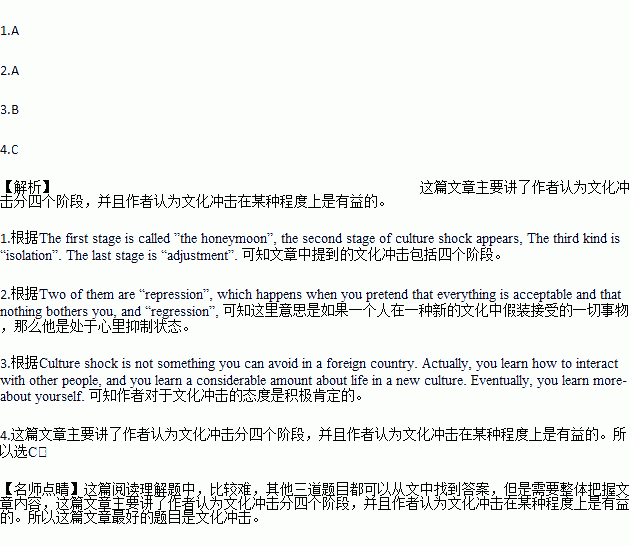题目内容
Do you think studying in a different country is something that sounds very exciting and great fun? Certainly, it is a new experience, one that brings the opportunity(机会) to discover amazing things and a feeling of freedom. But do remember that there are also some challenges you will meet, for your views may disagree with the different beliefs, norms(社会准则), values and traditions of different countries. This is called “culture shock”. The following are the stages of adjusting.
The first stage is called ”the honeymoon”, where you are excited about living in a different place, and everything seems to be fantastic.
Eventually, however, the second stage of culture shock appears, “the hostility stage”. You begin to notice that not everything that seemed so wonderful initially is now awful, making you feel distressed and tired. Usually at this point, you use some defense mechanisms(机制) to help you cope(应付) and to protect yourself against the effects of culture shock. Two of them are “repression”, which happens when you pretend that everything is acceptable and that nothing bothers you, and “regression”, when you start to act like a child, sometimes careless and irresponsible. The third kind is “isolation”. You don’t want to communicate with anybody, cutting yourself off the world. The last type is “rejection”, where you think you don’t need anybody, feeling you are coping fine alone.
After you deal with your hostile feelings, next comes the stage, “recovery”, when you begin to see things of a different culture you can learn to appreciate.
The last stage is “adjustment”. In this stage, you have reached a point where you actually feel good because you are able to understand the new culture.
Culture shock is not something you can avoid in a foreign country. Actually, you learn how to interact with other people, and you learn a considerable amount about life in a new culture. Eventually, you learn more-about yourself.
1.How many stages of culture shock does the text mention?
A. 4.
B. 6.
C. 7.
D. 8.
2.Which mechanism does a person apply if he pretends to accept everything in a new culture?
A. Repression.
B. Regression.
C. Isolation.
D. Rejection.
3.What’s the writer’s attitude towards culture shock?
A. Serious.
B. Positive.
C. Cautious.
D. Scared.
4.Which of the following can be the best title for the text?
A. A New Experience
B. Stages of adjustment
C. Culture Shock
D. Defense Mechanisms


 but don’t blame yourself for making it, especially in public.
but don’t blame yourself for making it, especially in public.